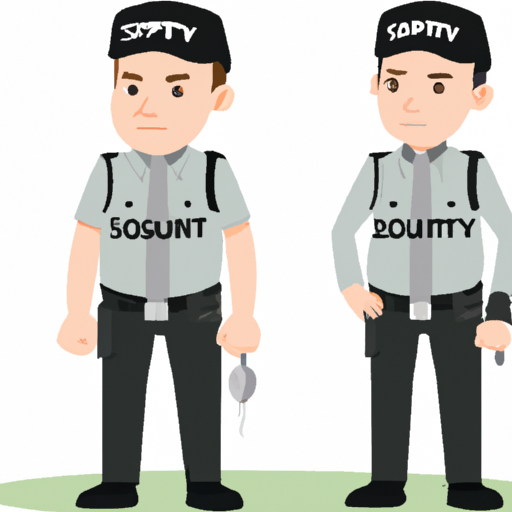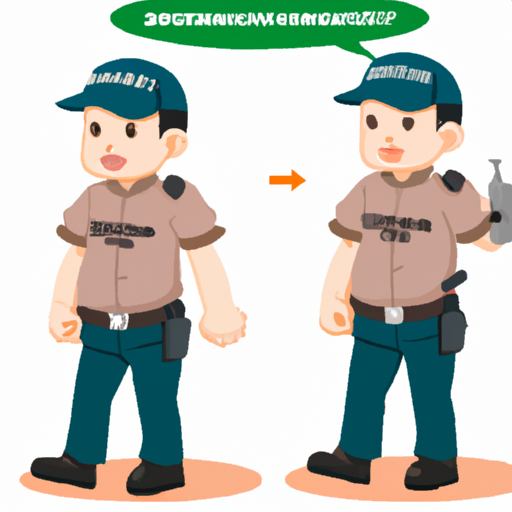Unarmed Security Guard Job Description: Ensuring Safety and Security
In an ever-evolving world, the need for safety and security remains paramount across various sectors and establishments. Unarmed security guards play a crucial role in maintaining order and protecting people and property. This article aims to provide a comprehensive understanding of the job description of an unarmed security guard — outlining their responsibilities, required qualifications, and the skills necessary to excel in this important role. In a neutral and formal tone, we will delve into the various aspects of this profession and shed light on the crucial contributions these individuals make to our collective well-being.
Table of Contents
- Responsibilities and Duties of an Unarmed Security Guard
- Required Skills and Qualifications for Unarmed Security Guards
- Understanding the Importance of Observation and Surveillance
- Maintaining a Visible and Professional Presence in Security Operations
- Effective Communication and Conflict Resolution Strategies for Security Guards
- Implementing Access Control and Security Measures
- Emergency Response and Crisis Management Protocols for Unarmed Guards
- Effective Documentation and Reporting Procedures for Security Incidents
- Ongoing Training and Professional Development for Unarmed Security Guards
- To Wrap It Up

Responsibilities and Duties of an Unarmed Security Guard
An unarmed security guard’s role encompasses a variety of responsibilities and duties, making them a crucial component of maintaining safety and security within a given setting. Their primary duty involves monitoring and patrolling assigned areas, ensuring the protection of individuals and property. This includes conducting regular security checks to deter any unauthorized access or activities.
In addition to their surveillance tasks, unarmed security guards are responsible for maintaining accurate records and writing detailed incident reports when necessary. They must possess strong observational skills, keen attention to detail, and the ability to remain calm and composed in potentially stressful situations. Effective communication is also vital, as unarmed security guards often serve as the initial point of contact for visitors, clients, and employees, providing assistance and addressing inquiries regarding security policies or procedures. Furthermore, they may be required to collaborate with law enforcement and emergency response personnel, should any security breaches or emergencies arise. To excel in this role, an individual must exhibit a high level of integrity, professionalism, and a commitment to upholding the safety and well-being of others.

Required Skills and Qualifications for Unarmed Security Guards
As an unarmed security guard, certain skills and qualifications are essential to excel in this role. While specific requirements may vary depending on the employer and location, there are some fundamental abilities and attributes that every prospective security guard should possess:
- Excellent communication: Being able to communicate effectively is crucial for an unarmed security guard. You must have the ability to articulate instructions clearly and concisely, as well as maintain professional and courteous interactions with the public, clients, and fellow security personnel.
- Observation skills: A keen eye for detail and strong observation skills are necessary to identify potential security threats and suspicious activities. Unarmed security guards must be vigilant and proactive in assessing situations and taking appropriate action to ensure the safety of the premises and individuals.
- Physical fitness: While not being required to carry a weapon, unarmed security guards still need to be physically fit to perform their duties effectively. This includes being able to stand and walk for extended periods, climb stairs if necessary, and respond quickly during emergencies or security breaches.
Moreover, unarmed security guards must possess a high level of integrity and professionalism, as they are entrusted with maintaining order and protecting people and property. Attention to detail, sound judgment, and the ability to stay calm under pressure are also vital qualities for this role. Although formal education is not always mandatory, completing a training program or obtaining relevant certifications can boost your chances of landing a position as an unarmed security guard.

Understanding the Importance of Observation and Surveillance
Observation and surveillance play a critical role in the responsibilities of an unarmed security guard. These individuals are tasked with ensuring the safety and security of a premises by monitoring and assessing potential risks. With the ever-increasing need for reliable security measures, an unarmed security guard must possess the skills and keen eye for detail necessary to detect and report suspicious activities.
One of the primary duties of an unarmed security guard is to maintain a constant watch over assigned areas. This involves actively monitoring surveillance cameras, patrolling designated spaces, and remaining vigilant for any signs of unauthorized access or potential threats. Through their observant nature, security guards can quickly identify unusual behavior, potential security breaches, or safety hazards, allowing for prompt intervention and appropriate response. Moreover, they are responsible for documenting and reporting any incidents or irregularities to their superiors, thereby ensuring a clear record of all activities within the premises.
In addition to their robust observation and surveillance skills, unarmed security guards often serve as a visible deterrent to potential criminals or unruly individuals. The uniformed presence of a security guard alone can discourage unlawful activities and promote a sense of safety among occupants. By maintaining a sharp focus on their surroundings and understanding the importance of situational awareness, security guards can respond promptly to emergency situations and coordinate with law enforcement authorities when necessary. Their abilities to remain calm and composed in high-pressure situations are instrumental in diffusing any potential conflicts and protecting the welfare of those within their jurisdiction.
Overall, the role of an unarmed security guard necessitates a deep understanding of the importance of observation and surveillance. These individuals act as the eyes and ears of a property, relying on their attentiveness and ability to assess potential risks to prevent and mitigate security breaches. By remaining vigilant and proactive, security guards play a vital part in maintaining a safe and secure environment.
Maintaining a Visible and Professional Presence in Security Operations
When it comes to the role of an unarmed security guard, is of utmost importance. A professional demeanor not only helps create a sense of safety and security, but also enhances the reputation of the organization. To ensure a visible and professional presence, here are some key practices that every unarmed security guard should follow:
- Uniform Appearance: Dressing in a standardized uniform that is clean, neat, and properly fitted is essential. This helps to distinguish you as a professional and enhances your visibility to both staff and visitors.
- Effective Communication: Clear and concise communication skills are paramount in the security industry. Maintaining a respectful and professional tone when interacting with individuals is crucial, whether it be colleagues, clients, or members of the public.
- Regular Patrols: Circulating through assigned areas in a consistent and systematic manner ensures that you are visible and accessible. Regular patrols not only deter potential security threats but also foster a sense of assurance among those present.
- Situational Awareness: Maintaining situational awareness is a crucial aspect of a security guard’s role. Being aware of surroundings, identifying potential risks, and taking appropriate actions to address them is essential for maintaining a safe and secure environment.
- Professional Conduct: Adhering to a code of conduct and displaying respectful behavior at all times is vital. This includes refraining from engaging in any actions or conversations that may tarnish your professional image, including the use of inappropriate language or behavior.
- Conflict Resolution: Developing skills in conflict resolution can greatly contribute to maintaining a professional presence. Having the ability to de-escalate tense situations and handle conflicts calmly and professionally is important in ensuring a secure and safe environment for all.
By following these practices, unarmed security guards can effectively maintain a visible and professional presence in security operations. Remember, your role as a security guard extends far beyond merely being present; it involves actively contributing to the overall safety and security of the environment in which you operate.
Effective Communication and Conflict Resolution Strategies for Security Guards
Effective communication and conflict resolution are essential skills for security guards, particularly those in unarmed positions. These strategies can help guards maintain a safe and secure environment while also fostering positive relationships with the public and clients. By utilizing these techniques, security guards can effectively handle challenging situations and prevent conflicts from escalating.
Active listening: One of the most crucial aspects of effective communication is active listening. Security guards must attentively listen to individuals involved in a situation, including potential suspects or those seeking assistance. This not only shows respect but also allows guards to gather relevant information and assess the situation accurately. Additionally, active listening involves maintaining eye contact, using responsive body language, and asking clarifying questions to demonstrate understanding.
- Clear and concise communication: Security guards should aim to communicate clearly and concisely to ensure their messages are easily understood. Using simple language and avoiding jargon or technical terms can help in this regard. Guards should also be mindful of their tone of voice, ensuring it remains professional and non-confrontational. It is important to speak confidently and assertively, conveying authority while still being approachable.
- Nonverbal communication: Nonverbal cues play a significant role in effective communication, especially when engaging with potentially confrontational individuals. Security guards should be aware of their body language, maintaining an upright posture, making appropriate eye contact, and using facial expressions that convey empathy and understanding. Proximity is also important; standing at an appropriate distance from individuals can help avoid misunderstandings or potential confrontations.
- De-escalation techniques: Conflict resolution skills are invaluable in the security industry. Security guards should be equipped with de-escalation techniques to defuse tense situations effectively. This may involve staying calm and composed, using active listening to understand the concerns of all parties involved, and finding mutually beneficial resolutions. Guards should strive to be empathetic, patient, and respectful, even in difficult circumstances. It is essential to prioritize safety while promoting open communication and conflict resolution.
Implementing Access Control and Security Measures
Access control and security measures are of utmost importance in maintaining the safety and integrity of any organization. By implementing strict access control protocols, we can ensure that only authorized personnel have entry to designated areas, minimizing the risk of unauthorized access and potential security breaches. To achieve this, an unarmed security guard plays a crucial role in carrying out various tasks and responsibilities.
Responsibilities:
- Monitoring CCTV cameras and promptly reporting any suspicious activities or breaches of security.
- Conducting regular patrols to ensure the premises are secure and free from potential threats.
- Enforcing access control policies by identifying and validating individual credentials and visitor badges.
- Providing assistance to employees and visitors by answering inquiries and directing them to the appropriate locations.
Skills and Qualifications:
- Ability to remain alert and calm in high-pressure situations.
- Excellent communication and interpersonal skills to effectively interact with individuals from diverse backgrounds.
- Attention to detail in detecting any signs of potential security risks.
- Basic knowledge of emergency procedures and ability to respond promptly in crisis situations.
Emergency Response and Crisis Management Protocols for Unarmed Guards
:
In the realm of security, preparedness is paramount. As an unarmed security guard, it is imperative to be well-versed in emergency response and crisis management protocols. These protocols exist to ensure the safety and security of both individuals and property in potentially dangerous situations. By following established procedures and training, unarmed guards can effectively handle emergencies, mitigate risks, and protect those in their care.
To begin, unarmed guards must possess a comprehensive understanding of emergency protocols, including effective communication strategies to relay urgent information accurately and promptly. This entails familiarity with various emergency codes and radio protocols, ensuring clear and concise communication during crisis situations. Guards must also be equipped with in-depth knowledge of evacuation procedures, including awareness of emergency exits, evacuation routes, assembly points, and accessibility arrangements for individuals with disabilities.
In addition, unarmed guards must be trained to assess potential threats and respond accordingly. This involves understanding the signs of danger, recognizing suspicious behavior or activities, and reporting such incidents to the appropriate authorities. By remaining vigilant and observant, guards can play a critical role in preventing harm and alerting the necessary personnel promptly.
Unarmed guards should also be well-versed in basic first aid and CPR techniques. These life-saving skills enable them to provide immediate assistance and stabilize individuals in medical distress until professional medical help arrives. Properly trained guards can administer first aid for injuries, control bleeding, perform CPR, and operate automated external defibrillators (AEDs) in accordance with established protocols.
Lastly, unarmed guards are responsible for the security and protection of the premises they are assigned to. This includes being knowledgeable about alarm systems, surveillance cameras, and access control procedures. Guards should know how to effectively respond to security breaches, unwelcome guests, or potential intruders by promptly alerting the appropriate authorities and following established security protocols.
By maintaining a strong understanding of emergency response and crisis management protocols, unarmed security guards play a vital role in ensuring the safety and security of their surroundings. Their attentiveness, quick thinking, and adherence to established procedures help create a secure environment for both employees and visitors, giving peace of mind and minimizing potential risks.
Effective Documentation and Reporting Procedures for Security Incidents
In order to maintain a secure and safe environment, it is crucial for unarmed security guards to possess . Here are some key practices that should be followed:
- Thorough Incident Reports: When an incident occurs, it is important for security guards to promptly and accurately document the details of the event. This includes recording the date and time, location, parties involved, and a detailed description of what transpired. All incidents, regardless of their severity, should be documented in a standardized format to maintain consistency.
- Evidence Preservation: As part of the documentation process, security guards should be meticulous in preserving any evidence related to the incident. This may include photographs, videos, or any physical evidence that can support the investigation and validate the incident report.
- Clear and Concise Language: Documentation should be written in a clear and concise manner, using objective language to convey the facts of the incident. Avoid personal opinions or assumptions and focus on providing accurate and detailed information. This ensures that all stakeholders can understand and interpret the incident report without ambiguity.
Moreover, security guards should embrace a proactive approach by reporting potential security vulnerabilities or risks they observe during their duties. This includes reporting malfunctioning security equipment, suspicious activities, or any security breaches that could jeopardize the safety of the premises. By promptly reporting incidents and potential risks, security guards play a crucial role in preventing future security breaches and maintaining a secure environment for all. Remember, effective documentation and reporting procedures are integral to the role of an unarmed security guard and contribute significantly to overall security measures.
Ongoing Training and Professional Development for Unarmed Security Guards
Security guard agencies understand the importance of . These programs are designed to ensure that guards are equipped with the necessary skills and knowledge to excel in their roles, providing top-notch security services to clients. Here are some key aspects of :
1. Comprehensive training programs: Security agencies prioritize thorough training programs that cover a wide range of essential topics. These programs typically include training on emergency response, access control, public relations, report writing, and conflict resolution. Guards are also trained in first aid and CPR, as their quick thinking and immediate response can be crucial in handling any medical emergencies that may arise on the job.
2. Specialized training opportunities: Security agencies also offer specialized training opportunities to help unarmed guards develop expertise in various areas. This may include training in surveillance techniques, crowd management, or handling high-risk situations. By enhancing their skill sets, guards can provide a higher level of security and effectively handle specific challenges they may encounter in their assigned roles.
Investing in ensures that they stay up-to-date with the latest industry practices and are better prepared to handle any situation that may arise during their duties. By providing comprehensive training programs and specialized opportunities, security agencies are committed to equipping their guards with the skills necessary to protect people and property effectively.
To Wrap It Up
In conclusion, the role of an unarmed security guard is of paramount importance in maintaining a safe and secure environment within various establishments. As this article has delineated, these professionals serve as the frontline defense, utilizing their extensive knowledge of security protocols to deter potential threats and swiftly respond to any arising incidents. With their exceptional observance skills and ability to remain calm under pressure, unarmed security guards play a pivotal role in ensuring the safety and well-being of both personnel and patrons alike. Whether it be securing access points, conducting routine patrols, or providing helpful assistance, these dedicated individuals actively contribute to the overall protection and smooth functioning of the premises they are entrusted with. By adhering to their job description diligently, unarmed security guards not only instill confidence among those they serve, but they also exemplify the highest standards of professionalism in the security industry.
